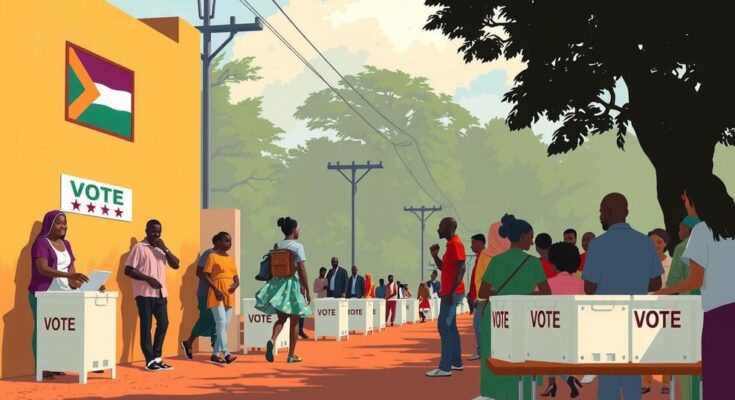The Gabonese presidential election, the first after the 2023 military coup, features Gen. Brice Clotaire Oligui Nguema seeking legitimacy and a seven-year term, while his main opponent, Alain Claude Bilie-By-Nze, challenges the regime’s transparency and ties with France. The electorate displays mixed feelings about the military leadership amidst ongoing poverty.
On Saturday, voters in Gabon participated in a presidential election amidst the backdrop of the 2023 military coup that toppled a longstanding political dynasty. This election marks a significant moment for the military leadership, which seeks to legitimize its authority. Approximately 920,000 registered voters, including over 28,000 residing abroad, went to over 3,000 polling stations, while a considerable portion of the population still lives in poverty despite the country’s oil wealth.
The interim president, General Brice Clotaire Oligui Nguema, who led the coup against President Ali Bongo Ondimba nearly two years prior, aims to consolidate his power for a seven-year term. Following the coup, President Bongo was briefly placed under house arrest, later released due to health concerns but his family faced legal troubles. Oligui Nguema has positioned himself as a unifying leader, promoting a campaign under the slogan “We Build Together” and has committed to holding credible elections.
The new electoral framework, established by a contentious code adopted in January, permits military personnel to compete in elections. The recently enacted constitution limits the presidential term to seven years, allows a single renewal, prohibits family succession, and abolishes the role of prime minister. These changes reflect a shift in governance and the desire for legitimacy following the coup.
Eight candidates are contesting the presidency, with Oligui Nguema facing significant opposition from Alain Claude Bilie-By-Nze, the former prime minister. Bilie-By-Nze advocates for restructuring public finances and severing ties with France, Gabon’s former colonial ruler. In a conversation with The Associated Press, he expressed skepticism regarding the election’s fairness, stating, “Everything has been done to lock down the vote.”
Voters turned out early in the capital, Libreville, demonstrating varied responses to the military regime. Some voters voiced skepticism, criticizing Oligui Nguema for surrounding himself with individuals linked to past corruption. Jonas Obiang, a voter expressing support for Bilie-By-Nze, remarked, “General Oligui Nguema led the country with the same people who plundered the country.”
Conversely, others, such as Jean Bie, accentuated the positive impact of military governance, citing completed projects and expressing hope for continued progress. As Gabon navigates this critical juncture in its political landscape, the outcomes of this election will be pivotal for the country’s future.
The presidential election in Gabon represents a crucial moment for both the military government and the electorate. General Oligui Nguema seeks to solidify his leadership amidst promises of reform, while facing substantial opposition from civil leaders promoting change. The divergent views among voters underscore the complexities of transitioning to a civilian governance structure and the challenges facing Gabon as it aims to redefine its political trajectory following the military coup.
Original Source: www.news4jax.com




